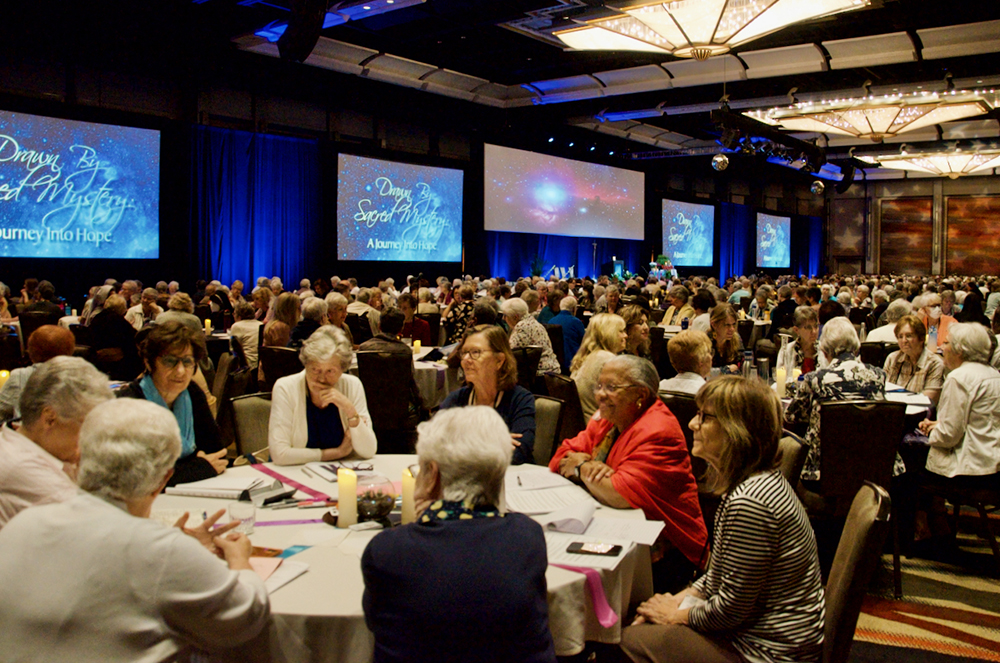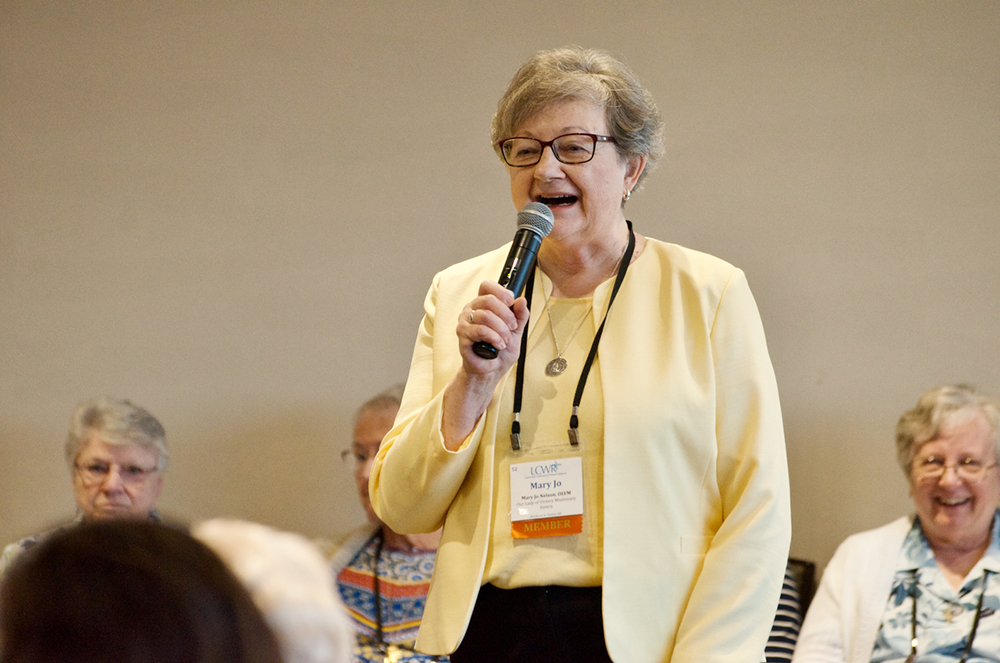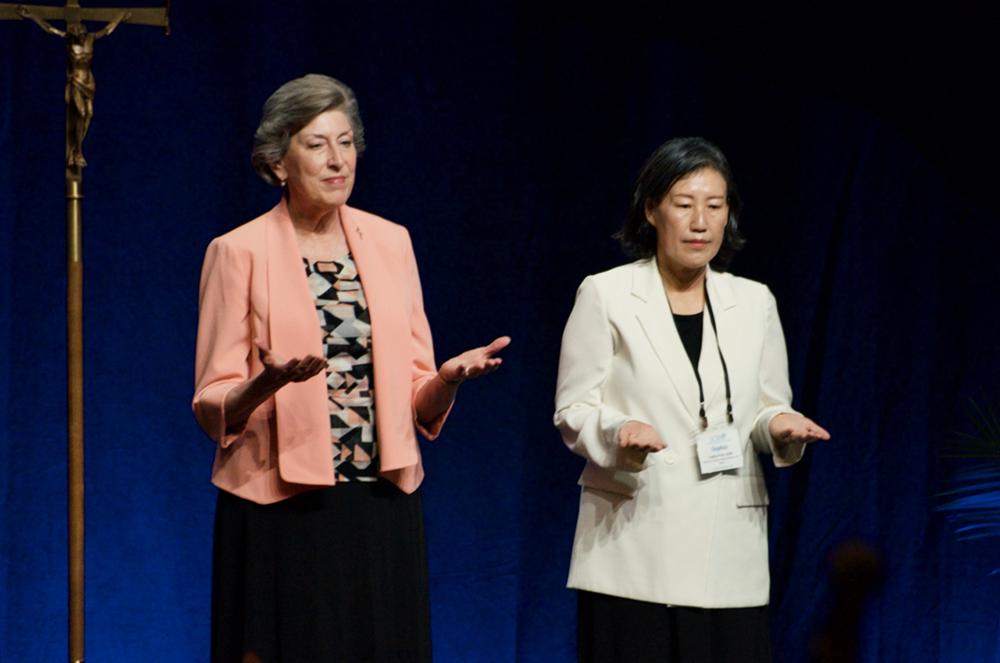
Nearly 900 sisters and guests are gathered Aug. 10, 2023, at the Leadership Conference of Women Religious assembly in Dallas. (GSR photo/Dan Stockman
The Leadership Conference of Women Religious' annual assembly entered a new era Thursday (Aug. 10) as the group offered eight workshops centered around the changes taking place in religious life in the United States.
LCWR assemblies are usually centered around organization business and inspiration, but this year's event took time for breakout sessions where the topics were all suggested by members. The workshops included the challenges of intercultural leadership and re-thinking congregational chapters.
LCWR, whose member congregations comprise about two-thirds of the nearly 40,000 Catholic sisters in the United States, is holding its assembly Aug. 8-11 here. Nearly 900 sisters and guests are attending the event.
A session on collaboration shared how the Benedictine sisters in Watertown, South Dakota, just a few years ago thought their 500-acre motherhouse campus was an albatross they needed to sell. Today, a state-of-the art senior care community open to both sisters and laypeople is operating and nearing capacity, affordable housing will start construction in the spring, and student housing for Lake Area Technical College will start construction soon. Eventually the campus, called Harmony Hill, will be home to 700 new residential units, childcare, retail, and dining, all surrounded by acres of green space. All of it is happening because of collaboration with other groups, agencies and government.
"It will be a place to live, work and play," said Benedictine Sr. Barbara Younger. "In 2017, we did not have plans this grand — we were really just looking for a way to get healthcare for our sisters."
Advertisement
Attendees also heard about Gerard Place, a collaboration of 12 congregations of women religious in the Buffalo, New York, area that has been operating since 2000, providing safe housing for women and children, workforce development, childcare, health clinics, education and senior services, and Cor El Centro in Milwaukee, a collaboration that provides access to natural health, especially for those on the margins of society.
At a session on communities that are coming to completion, sisters discussed where they are on the journey, what they have learned and what might come next. The session was called "Sacred Encounters," and participants seemed hopeful that wherever God is leading their communities, they are in good hands.
"There's a spirit of all-rightness with this. We know there will be a letting go, but it will be for new things," said Sr. Cathy Artale, of the Congregation of the Infant Jesus in Rockville Centre, New York. "I don't think it's a time to be in despair or hopelessness, but to follow God's way."
Another participant said it's not so much the congregational things that hurt as the personal: "We're grieving our friends who are dying. It's not that I miss the motherhouse, it's that I miss my best friend."
According to statistics LCWR officials shared at their 2022 assembly, one-third of all congregations in the United States have fewer than 50 members, and the number of communities with enough members to hold a chapter and elect leaders is expected to drop dramatically after 2025.
"We're grieving our friends who are dying. It's not that I miss the motherhouse, it's that I miss my best friend."
The session on re-thinking chapters was an open and frank discussion of the challenges and some possible solutions, but facilitators noted some questions can only be answered by canon lawyers and the Vatican's Dicastery for Institutes of Consecrated Life and Societies of Apostolic Life (CICLSAL).
Facilitators Srs. Catherine Bertrand and Carole Shinnick, both School Sisters of Notre Dame, and Dominican Sr. Linda Gibler included choosing a planning team, encouraging widespread participation in the planning and using the contemplative dialogue process. Holding the chapter at a separate setting from the motherhouse is beneficial when possible, with the use of live streaming and other technology to ensure other sisters, particularly elderly sisters, are able to witness and participate in the proceedings. But while associates and lay people serving as staff should be encouraged to participate in the planning, voting is still reserved only to congregational members under canon law.
Discussion and questions during the session pointed to the stark reality of a dearth of members able to serve as congregational leaders: Even congregations able to currently install leadership teams have to prepare for a future in which they may not be able to do so.
Victory Noll Sr. Mary Jo Nelson, facilitator of the Sacred Encounters session, said CICLSAL wants to work with the leadership conferences of religious to find a way forward.
"Rome knows we are in crisis and that the leadership model we have is not sustainable," Nelson said. "I think there's hope, because it was the dicastery that said we need help and we need to work together. We will find a way to help each other. We will find a way."

Victory Noll Sr. Mary Jo Nelson facilitates a breakout session on congregational completion Aug. 10 at the Leadership Conference of Women Religious assembly in Dallas. (GSR photo/Dan Stockman
Another session examined the challenges faced by international congregations, who are finding it requires a special dependence on the Holy Spirit "and a lot of imagination," as they deal with differences in language, culture, ways of seeing the world, interpretations of charism and spirituality, the impact of colonization and wounded histories, not to mention practical concerns such as time zones, equity in resources for education, technology and travel, and dealing with national and international conflicts.
Solutions include new technologies for international communication and requiring all members to learn at least two languages used within the congregation, spending time together across cultural lines, sharing stories of both history and daily living, education and heritage retreats. But most important, participants said, is nurturing the desire and intention for the communion of hearts.
And some international congregations face a unique challenge: After decades of leadership being in the United States, some now have the vast majority of their members — and thus their leadership — either based overseas or coming from those areas. A session on intercultural leadership examined the issues faced by leaders trying to lead in a culture that is utterly new and often bewildering.
Participants said patience, being open minded and finding support systems are key, and both cultures need to work together to find true interculturality.

Grand Rapids Dominican Sr. Barbara Reid and Sisters of the Holy Names of Jesus and Mary Sr. Jung Eun Sophia Park receive a blessing before giving a reflection Aug. 10 at the Leadership Conference of Women Religious assembly in Dallas. (GSR photo/Dan Stockman
Assembly participants also heard a reflection by Grand Rapids Dominican Sr. Barbara Reid and Sisters of the Holy Names of Jesus and Mary Sr. Jung Eun Sophia Park. Reid talked about how, when Jesus appeared to Mary Magdalene at the tomb after the resurrection, he told her, "Do not hold on to me" — saying, in essence, "Do not hold on to the way you have known me" because things have changed.
And when Jesus later appeared to the disciples, they had to wonder "how they can be sent on mission in such a broken and sorrowful state." But Jesus breathed on them, told them to forgive everyone they can and to hold fast to one another. We must be drawn into that same holy mystery, Reid said, "holding on to everyone as we create ever-widening circles of love and mission."
Park noted that with the crucifixion and resurrection, everything that did not matter was stripped away, and urged attendees to examine what the real essence of religious life is.
"If there were no members, no property, what remains of religious life?" she asked. "We must find the core value of religious life," adding that sisters must intentionally welcome a new world, live by crossing borders, embracing mystery and creating community. "This is how we survive," Park said.
[GSR international liaison Sr. Joyce Meyer and GSR columns editor Sr. Helga Leija contributed to this report.]






